roman history final
1/23
There's no tags or description
Looks like no tags are added yet.
Name | Mastery | Learn | Test | Matching | Spaced | Call with Kai |
|---|
No analytics yet
Send a link to your students to track their progress
24 Terms
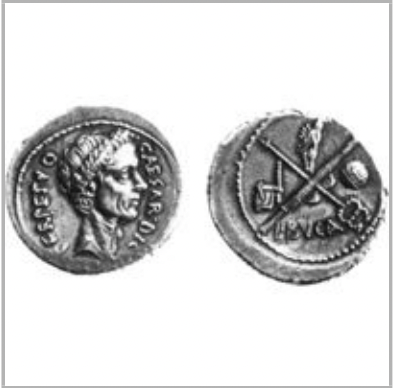
Name: Coin: Obverse: J. Caesar as dictator for life
Date: 44 BC
Location: Rome
Description: Once again, this coin is used for propaganda. It celebrates Caesar becoming dictator for life. This made a lot of people angry, as it reminded them of what Sulla had done. He is assassinated shortly after becoming dictator for life.
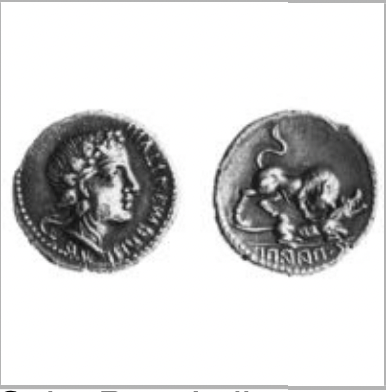
Name: name: Coin: Rev: Italian bull gores Roman wolf
Date: Late-Republican period, dated to ca. 90 BC
Location: italica
Description: referred to the social wars, another representation of events/politics seen on coins. shows the bull (italica) goring the roman wolf
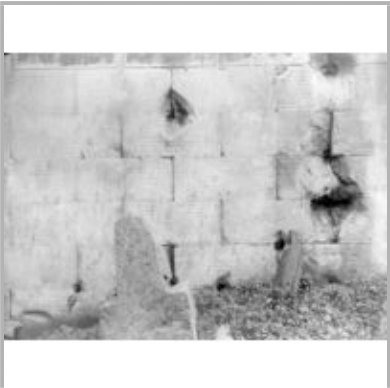
Name: Res Gestae of Augustus,
Date: 1st century AD
Location: Ankyra, Turkey
Description: The Res Gestae is an inscription that describes Augustus’ life and accomplishments. It states that Augustus did not take any power from the state that was not traditional. It gives insight as to how Augustus presented himself to the Roman people.
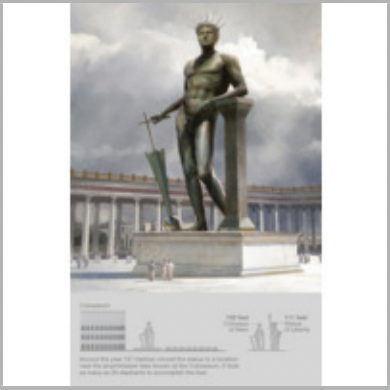
Name: Nero's Colossus
Date: Neronian period
Location: Rome
Description: Nero built a major complex on cleared land after the major fire of 64. Part of the complex was the Colossus of Nero, a giant statue of himself. The colosseum will be built near this statue and will give the colosseum its name.
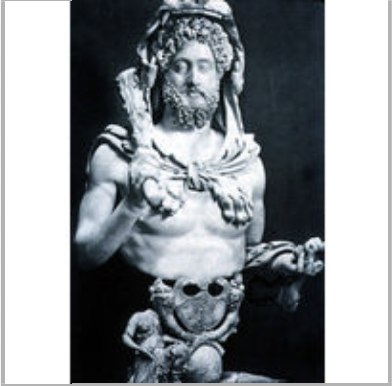
Name: "Commodus," bust sculpture: As Hercules
Date: Antonine period, dated to 192
Location: Horti Lamiani, Rome
Description: Commodus frequently portrayed himself as Hercules, and even had himself deified as the incarnation of Hercules. He would dress up as Hercules and perform beast fights in the colosseum.
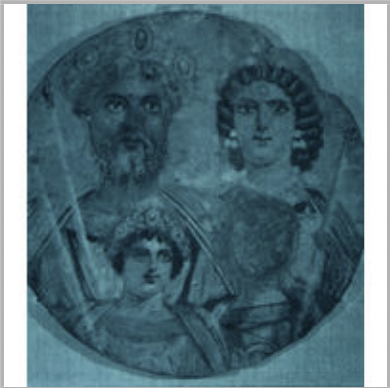
Name: Painting: Septimius Severus, Julia Domna & Caracalla
Date: Severan period, dated to ca. AD 199
Location: n/a
Description: coin depicts Severus, his wife, and his two sons. Caracalla has Geta killed because they were co-heirs. Geta’s face was scratched out of the painting, indicating Caracalla enacted damnatio memoriae against his brother.
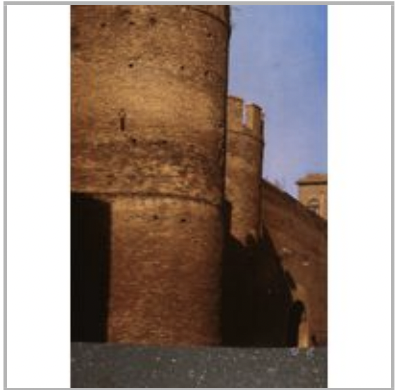
Name: Aurelian Wall
Date: Aurelian period, dated to 272-75 AD
Location: Rome
Description: The Aurelian wall was built, as the Servian wall had become useless. It enclosed more land, including Trastevere and the Campus Martius. It was built quickly. It also showed that Rome was worried about its ability to defend itself from invaders
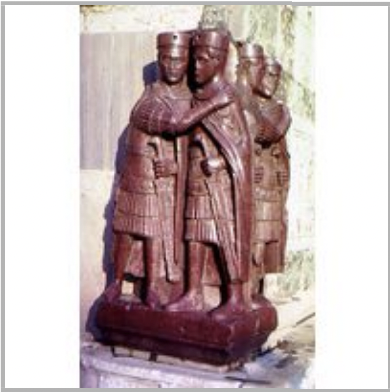
Name: Sculpture: Tetrarchs made of porphyry
Date: Tetrarchic period, dated to ca. AD 300
Location: Venice
Description: Shows the tetrarchs standing together. They are embracing as allies, showing that they are friends. Shows the Augustus with his Caesar, and their partnership
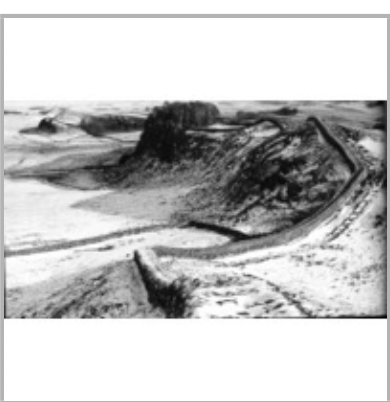
Name: Hadrian’s wall
Date: Hadrianic period, dated to shortly after AD 121
Location: Britain
Description: Builds a wall in northern Brittanica, where the island narrows. Keeps out tribal opposition because they have smaller numbers. Has watch towers so that they can see the enemy coming and gather the army. Focused on fighting outside of Roman territory
trajan’s column
location: rome
date: 113
relevance: Trajan's Column is a Roman triumphal column in Rome, Italy, that commemorates Roman emperor Trajan's victory in the Dacian Wars. shows the superiority of the Roman military
year of the 4 emperors
date: 69 BC
relevance: four different emperors successively held power: Galba, Otho, Vitellius, and Vespasian. This period marked the end of the Julio-Claudian dynasty and the beginning of the Flavian dynasty. time of chaos and political violence
diocletian
date: 284-305 emperor
location: roman empire, east
relevance: as emperor, he started the tetrarchy. he stabilized the empire after the crisis of the third century. he voluntarily retired.
Milvian Bridge
date: 312
location: milvian bridge, rome
relevance: battle of the milvian bridge between constantine and maxentius. constantine won and became sole emperor of the roman empire. constantine had a vision of the cross before the battle, and he converted to christianity after that.
Constantine
date: 306-337
location: roman empire
relevance: ends the tetrarchy by becoming sole emperor. converts to christianity and legalizes christianity. establishes constantinople as a major city, serving as a second rome
The Good Emperors
date: 96-180
location: rome
relevance: time in which emperors did not pass emperorship to their sons, but instead chose someone competent to do the job. lots of positive reforms and stability to the empire
Social War
date: 90 BC
location: italian peninsula
relevance: war because people wanted roman citizenship. they were under roman control but did not have the same rights as romans. Lex granting citizenship to allies who had not rebelled and those who stop fighting in the social war. war ends because people received citizenship
Pliny the Younger
date: born 61 AD
relevance: pliny and tacitus were both historians who wrote letters to one another. pliny is a historian and political figure. becomes close with trajan as his advisor and writes him letters. we know a lot about history because of the letters pliny wrote.
Danube River
location: separates roman empire from germanic region
relevance: border that was under constant turmoil in the crisis of the third century. played a major role in this crisis, as emperors could not be in two places at once and there was also conflict in parthia. served as a clear border for the roman empire
Jewish Revolt
location: judea
date: 66 ad
relevance: a series of conflicts between the Jewish population of Judea and the Roman Empire. titus supresses the rebellion and stops the revolt by sacking the temple, leads to the arch of titus.
Sulla
date: dictator from 82-79 bc
relevance: appointed dictator for life. During his dictatorship, makes sullan reforms which shifts power to the senate and away from the tribunes. initiates proscriptions, time of fear
Actium
date: 31 bc
location: actium in greece
relevance: mark antony is killed and octavian can now be sole ruler. officially ends second triumverate
Sejanus
date: died 31 AD
relevance: equestrian, ally of tiberius who plots to have him killed. sejanus is found out and arrested
Senatus consultum ultimum
The final decree of the senate
The senate says to someone go and do what you need to do to protect the state and we will back you up
See to it that the state suffers no harm
Authorizes illegal activity to protect the state
The Flavians
date: 69-96 AD
relevance: flavian dynasty started after the year of the four emperors. included vespasian, titus, and domitian. ended with the assassination of domitian
its vast construction programme in the city of Rome, intended to restore the capital from the damage it had suffered during the Great Fire of 64, and the civil war of 69.